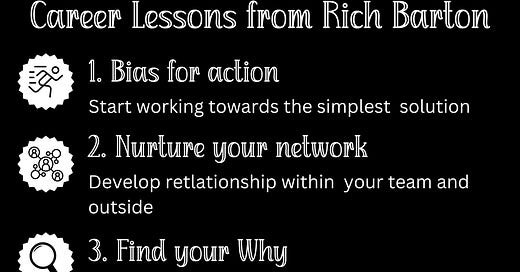Career lessons from Rich Barton - Founder of Expedia, Glassdoor and Zillow
A bias towards action, developing your network, comfort with ambiguity and storytelling will serve you well in your career
Tell me in a sentence
A bias towards action, developing your network, comfort with ambiguity, and storytelling will serve you well in your career
Tell me in an image
Tell me more
Rich Barton is a serial entrepreneur who founded Expedia, Glassdoor, and Zillow. I found his interview very valuable1. He grew up with an entrepreneurial spirit. He sold ice creams during his teenage years and had a house painting company for many years.
I am surprised to see that the interview has less than 700 views. It reminded me of the story about a famous violinist playing at a subway station with almost no one paying attention.
Below are some of the takeaways that we can apply to our careers.
A step in the right direction is worth three steps of planning
Expedia started off as a Microsoft proprietary product but pivoted to a standalone web application once browsers(Netscape) came along2. The Expedia team did not have it all figured out when they started off.
Later in the interview, Barton talks about how his team did not have a grasp on a suitable business model even during Zillow's Series B. Again, that did not stop them from getting started - albeit with the goal of building a brand first.
If you have an interesting problem that you want to solve, start working towards the simplest possible solution(Minimum Viable Product) and then iterate. Complex and refined systems evolve from simple ones.
Get things done with help from your allies
Barton spun off Expedia from Microsoft. He attributes his success to help from key people within the organization3.
Develop a relationship with people from different teams in your company. Set up that coffee chat.
Build and nurture your network
Developing a great relationship with your manager, your coworkers, and your team is very valuable. Barton mentions that many of the current Zillow leaders were part of the original Expedia team4. This appears to be a common theme for serial founders almost as if we should call them a serial founding team - like the Paypal mafia.
Develop a relationship with your team. Your new teammate may be your next co-founder.
Find your Ikigai role
Barton loves building stuff and building them with great people. That defines his Ikigai. When asked about why he did what he did, he could have said a lot of different things. Breaking down information silos for customers is his evergreen thesis. All his companies are tech companies solving interesting problems. But Rich has zeroed in on his why.
Evaluate your values, passion, and skills to identify your Ikigai role.
Find your version of work-life balance
Barton talks about how he learned to balance his family, friends, self, and work over time. You should be able to unplug and relax, even when you feel the world revolves around you. Rich talks about how having the right trustworthy team in place helps with it5.
Delegate. Document. They help you time travel.
Take calculated risks
The Zillow team took a big swing with the homebuying program. But when the pandemic hit and the underlying risk changed, they shut the program down and moved on6. Barton considers the ability to take big swings as a key to innovation.
Take calculated risks and adjust as you learn.
Understand your customer
Barton shows a deep understanding of his customers. He talks about Zillow users’ dreams about a home, and not about a mortgage. The first product from Zillow, Zestimate, was a hit with the end users because it was a well-designed product that served specific customer informational needs.
Understand your audience and tailor your products/presentations accordingly.
Set ambitious goals
Barton is comfortable setting ambitious long-term goals for Zillow and has the plan to achieve the same. He talks about his plans to double the value capture rate to 6% by 20257.
Think about your career goals for this year. Where do you want to be 5 years later?
Accept what is out of your control, but make the most of it.
Barton is very confident about Zillow’s prospects in the current market, where the economy is heading to a recession and the residential housing market is in a downturn. He is eager to make the most of it, like by buying up some competition8.
Ups and downs are natural, both in your career and in the economy. Don’t worry about the layoffs in the tech industry. Make yourselves unfirable. Continue your career journey.
Be a storyteller
When asked about the future that Zillow is building, Barton talks about how Zillow is building a bridge over the chasm of despair in a home buyer's journey and taking you to the sunshine9. While he talks about specific pain points that Zillow is planning to solve, a bridge that takes you to the sunshine drives the idea home.
Your audience will not remember your KPI, but they will remember your story.
Make decisive decisions
Zillow's leadership moved fast and decisive when the pandemic hit by moving towards a remote-friendly work environment. While Barton is still formulating the best strategy, Zillow has not experienced any issues from the employees like a lot of other companies have.
Do not delay decision-making, especially if you are a leader. Be comfortable with ambiguity.
Thanks to the internet, we can all learn from the best out there. Go ahead, and apply your learnings.
And I am curious to learn what Barton has in his hands. Looks like a large black-golden coin.
10-minute mark in the interview




